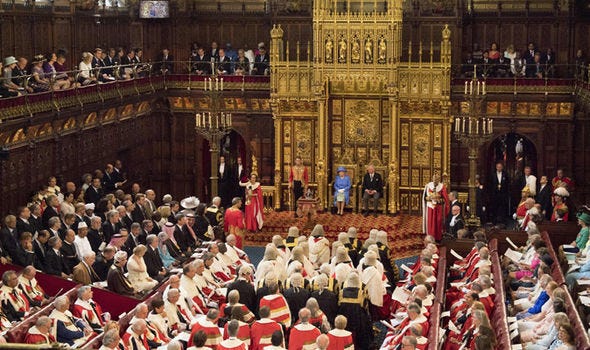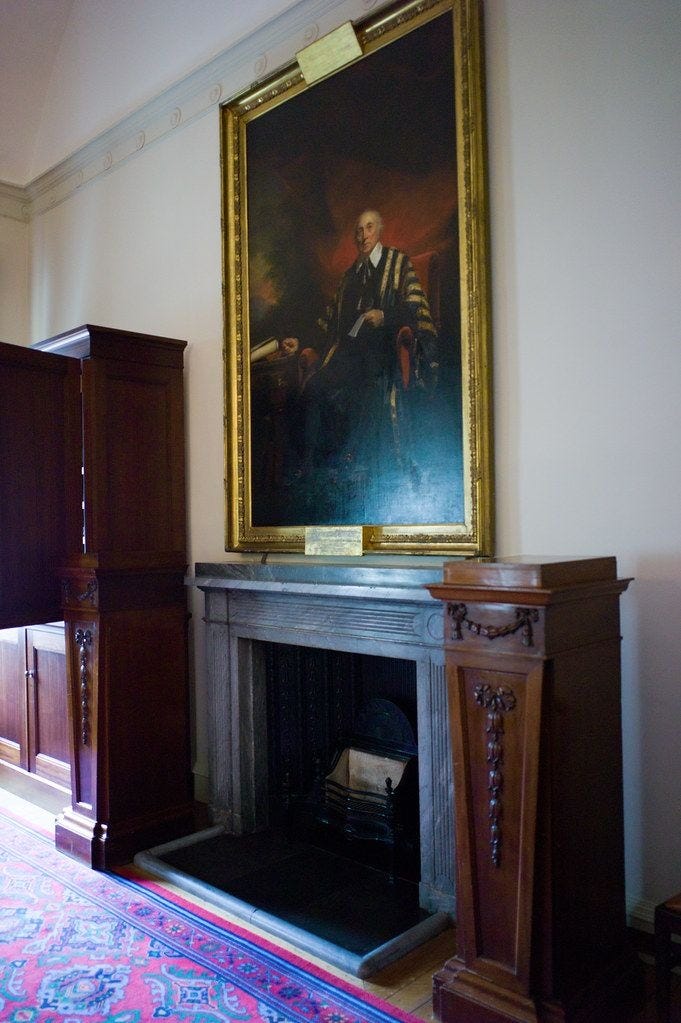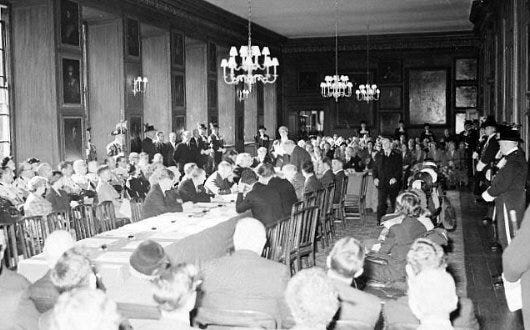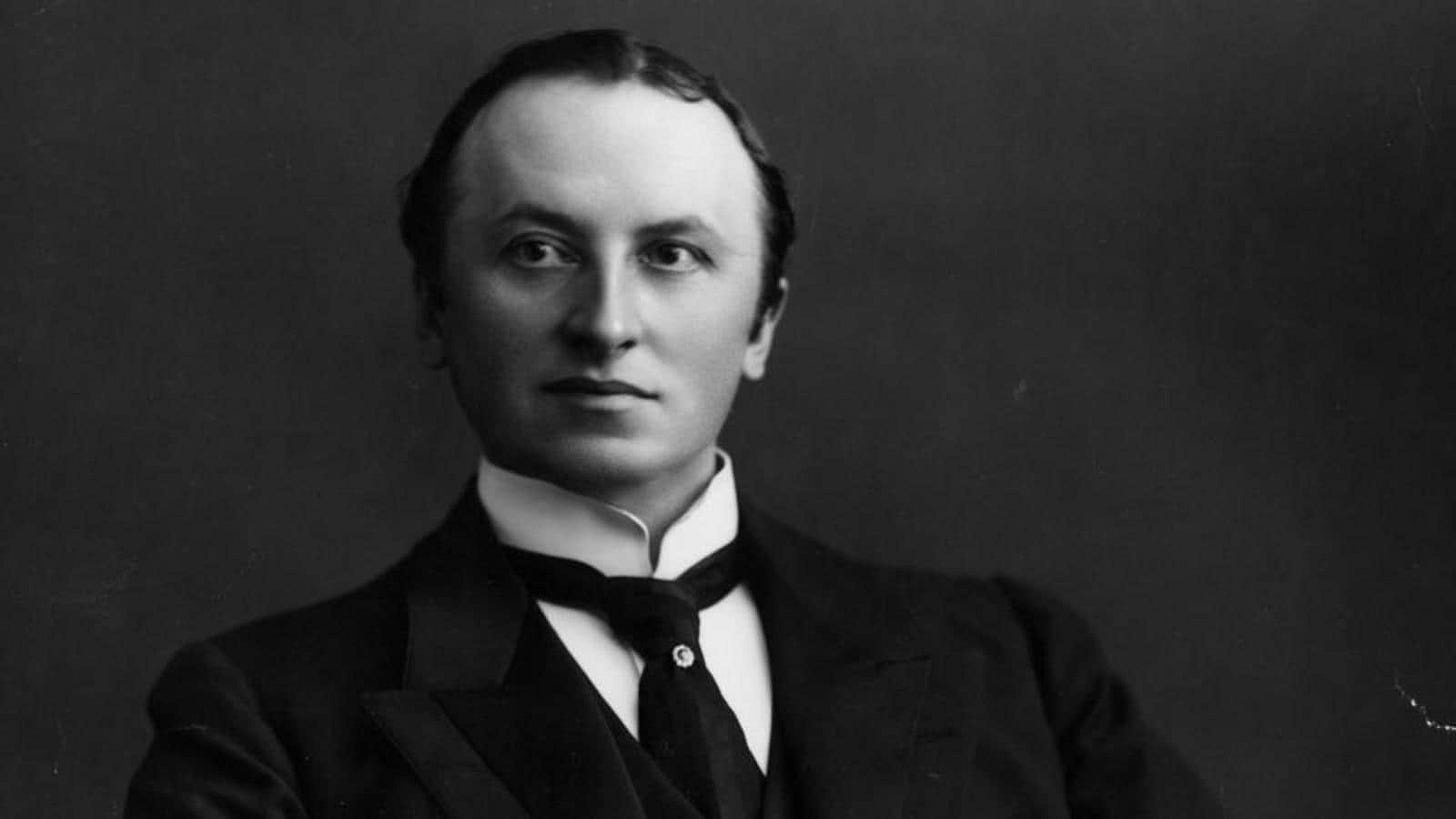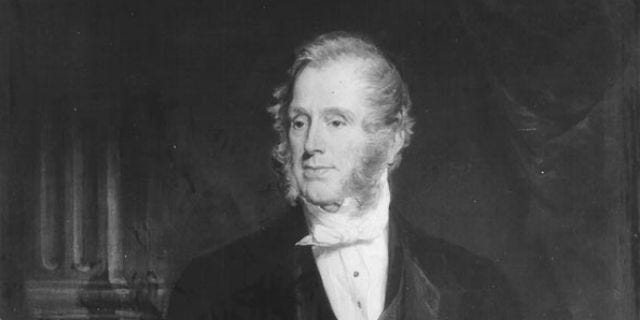You've been elected, my lord: selection in the House of Lords
The upper chamber may not be democratic, but it's had elected components off and on since 1707
It is a standing joke in Westminster that the House of Lords is an unaccountable, unelected chamber, except that the remaining 90 hereditary peers who are the “interim” phase of Blair’s reform plans of 1997-98 are elected, albeit only by their fellow hereditaries. I confess an interest: I love the by-elections which keep the number of hereditary peers topped up, as they are, in their own convoluted way, an exercise of democratic choice, and produce some perfectly respectable candidates for the legislature, but also retain just a whiff, a hint, a suggestion of P.G. Wodehouse (or sometimes Fr Rolfe).
Let me explain for those who are not parliamentary groupies. When the House of Lords Act 1999 was passed, as the initial bid of Tony Blair’s grand ambitions to modernise the UK’s legislature, he agreed a deal with the leader of the Conservatives in the Lords, Robert Cranborne, that the “interim” house would contain 92 hereditary peers, as a kind of hostage to the future and a concession to those who opposed reform altogether. Of those 92, two were to sit by virtue of the positions they held, two of the great officers of state: the lord great chamberlain (then the Marquess of Cholmondeley, now Lord Carrington, according to a complicated formula) and the earl marshal (the Duke of Norfolk, by heredity).
The others were elected from the whole body of hereditary peers—all 1,115 of them—according to a complex formula. 15 were elected by the whole House to provide for deputy speakers and other office-holders; 42 Conservatives were then elected solely by their party colleagues, along with 28 cross-benchers, three Liberal Democrats and two Labour peers, representing the parties’ respective strengths in the hereditary element of the pre-reform House. The office-holders were chosen in 27/28 October 1999, and the party representatives on 3/4 November, before the act was given Royal Assent and came into force on 11 November (appropriately, or inappropriately, Armistice Day).
This was an interim measure, remember, but there had, clearly, to be provision for replacing any hereditaries who died (some were not in the first flush of youth). Initially, until November 2002, vacancies were filled by those unsuccessful candidates who had won most votes in the 1999 poll, but this could not be relied upon in the longer term, or until stage two of the reforms. Accordingly, a system of by-elections was devised. An election must be held within three months of a vacancy occurring due to the death, resignation or disqualification of an hereditary peer (since the passage of the House of Lords Reform Act 2014 this also occurs if a peer retires under the act’s new provisions). The candidates are drawn from anyone who is listed on the Register of Hereditary Peers and is from the relevant party group, while the electorate comprises those “excepted” hereditary peers (i.e. those already elected to sit in the House) of the party group. In the case of by-elections to replace any of the 15 office-holders elected by the whole House, life peers may also vote.
There have been 53 by-elections since the procedure was introduced in November 2002. Here is the then-clerk of the parliaments, David Beamish, announcing the result of an election in 2012. Keen-eyed readers will have noticed that stage two of Blair’s reforms now resembles Beckett’s famously waited-for Godot; at least two major attempts to introduce further reforms have foundered, and the Lords have themselves made only small changes to the House. The candidates sometimes seem rather unprepared for the rough-and-tumble of grubbing for votes, especially those, more numerous in the early days, who had been members of the pre-1999 House. But that has its own charm. The by-elections are, for those in the right mood, the most enormous fun.
This is not to say they are an entirely whimsical exercise. If one concedes the presence of an hereditary element in an “interim” House, then replacements must be chosen somehow. This system seems as good as any. Nor are all the new peers thus chosen no-hopers or crusty backwoodsmen. The 4th Lord Ashton of Hyde, a Conservative elected in 2011, was a successful insurance broker and member of the Council of Lloyd’s, and ended up serving three years as government chief whip in the Lords. The 12th Lord Vaux of Harrowden, a cross-bencher elected in 2017, qualified as a chartered accountant and was managing director, corporate development, of SunGard Data Systems, part of a US conglomerate. The Labour Party has even closed the circle of the hereditary peerage last year by electing the 3rd Viscount Stansgate, eldest son of Anthony Wedgwood Benn whose campaign to be freed from his unwanted hereditary peerage had led to the Peerage Act 1963 and the ability for peers to disclaim their titles.
It must be admitted, however, that some candidates seem a little at sea. In the run-up to each by-election, candidates may submit a short passage of text explaining why they wish to serve in the Lords. Some use this opportunity wisely. If we look at the by-election held in July this year for two Conservative vacancies, replacing Lord Brabazon of Tara and Lord Swinfen, there are some appealing tracts. Lord Baillieu tried to catch the mood of current international politics.
London based. Member of the Conservative Party. I have gained a large amount of experience having worked in banking and finance in Australia, Hong Kong, and particularly in Russia. This Russian experience could well support a diplomatic solution to the current Ukraine situation, which is now developing into a food and energy crisis. I wish to become an active, working member of the House of Lords.
Lord Wrottesley, an accomplished sportsman, set out his qualifications but also leavened his statement with a dose of self-deprecating humour.
I took my seat 25 years ago, but relative youth meant not offering myself for election. An Olympian, Chaired British Bobsleigh and Skeleton, now Chairing Ice Hockey UK, sit on the Finance Committee of the International Ice Hockey Federation, and the board of GB's best ever performing Winter Sport, British Skeleton. A stint in Finance in the noughties, closet tree hugger, as reflected in my business interests. More broadly interested in the environment, defence, housing.
Other candidates did not quite hit the mark. The Earl of Dudley, a perennial contender in these competitions, relied on a YouTube channel which he had wheeled out in previous attempts. I will leave readers to decide for themselves whether they would have found this mini-manifesto persuasive. My favourite, however, in a crowded field, is the statement offered by the Duke of Rutland at a by-election in 2015 for cross-benchers. It deserves to be reproduced exactly as his fellow peers saw it.
It need not, perhaps, be stated that none of these candidates mentioned above was successful. But God loves a trier.
There have been attempts to end the curious spectacle of these by-elections, which I think would be a shame. Lord Grocott, a former Labour chief whip in the upper house, has repeatedly introduced a House of Lords (Hereditary Peers) (Abolition of By-Elections) Bill [Lords], but it has not proceeded beyond relatively early stages as yet. His argument is that the elections should be scrapped and the 90 hereditary peers allowed to dwindle away. My own view is that, to honour the spirit of compromise which saw the 90 peers allowed to remain in an “interim” House, any abolition of the by-election system should be postponed until there is at least concrete progress towards further reform. If the supposed absurdity of this elected element in the “unaccountable” chamber focuses minds and acts as grit in the oyster, so much the better.
The strangest aspect of all of this is that electing a portion of the House of Lords to represent a larger body is a very old tradition, going back to the Acts of Union 1707. When the English and Scottish Parliaments had been ‘merged’ (to be generous), there were 168 members of the English House of Lords and 154 Scottish peers (the old Parliament of Scotland was unicameral). The English peers feared being almost outnumbered by their new Scottish colleagues and made it clear that a simple merger was unacceptable, so a compromise was forged in the Articles of Union. Article 22 provided that 16 Scottish peers would be admitted to the House of Lords of the new Parliament of Great Britain (though article 23 allowed that Scottish and English peers would have the same privileges).
The 16 Scottish representative peers would serve for a parliament at a time (in those days a maximum of seven years), with the ability to be reselected. So how was the Scottish peerage to choose its 16 representatives? The procedure was straightforward if formal. At the summons of a new parliament, the sovereign issued a proclamation for Scottish peers to gather at the Palace of Holyroodhouse. In the Great Gallery, the lord clerk register, one of the Scottish great officers of state with responsibility for maintaining public records, would read out the names on the Peerage Roll, with each peer indicating by voice his presence. The lord clerk register would then read the roll again, and each peer would indicate how he was voting; the results were collected and then sent to the clerk of the crown in London. The same rather elaborate process was used to fill vacancies, like today’s by-elections.
In the early days, this arrangement took a little while to become properly established. In 1711, the 4th Duke of Hamilton (holding a title in the peerage of Scotland) was created 1st Duke of Brandon in the peerage of Great Britain. This should prima facie have entitled him to a seat in the House of Lords (of the Parliament of Great Britain) but when he tried to attend, he was denied access, as he was not an elected representative peer. The Lords reasoned that the Articles of Union prescribed that there should be 16 representatives of the peerage of Scotland, neither more nor less, and so His Grace’s Great Britain title was irrelevant; moreover, they said, article 23 stipulated that “no peer of Scotland could, after the union, be created a peer of England” (not, in fact, what had happened). Quite how he was supposed to resolve this problem, short of waiting for the next dissolution and standing for election as a representative peer, is not clear. The broader argument outlived the Duke, who was killed in a duel in Hyde Park in 1712, but in 1782 the decision was reversed in favour of the 6th Duke of Hamilton.
This arrangement of electing a handful of peers continued for centuries. Of course, new peers created after 1707, and therefore in the peerage of Great Britain, were entitled to sit in the House of Lords (pace the Duke of Hamilton), so those with titles only in the peerage of Scotland were not growing in number. In 1963, the Peerage Act (mentioned above), as well as allowing new peers to disclaim their titles, also granted all peers of Scotland the right to sit in the House of Lords, and the system of electing representative peers was thereby abolished.
Scotland was not the only source of a constitutional anomaly, or at least quirk. The Acts of Union 1801 merged the (bicameral) Parliament of Ireland into that of Great Britain to produce the Parliament of the United Kingdom we have today. Under the provisions of the union, the Irish peers (only the Protestant lords until the Roman Catholic Relief Act 1829) were to elect 28 of their number, for life as opposed to the Scottish arrangement of for a parliament, to serve in the House of Lords. The first election was held in the chamber of the Irish House of Lords in Parliament House in Dublin (incidentally the world’s first purpose-built bicameral legislative building). The process, with each peer voting in an open and public ballot, was overseen by the clerk of the crown and hanaper, an Irish official. The initial event was slightly marred by the government circulating a list of the successful candidates before the ballot had occurred.
Because Irish representative peers were elected for life, there was no need for a regular gathering of the sort the Scottish peers had. Vacancies were filled by postal vote, required to be held within 52 days of the vacancy occurring (almost always due to the death of the peer, though at least once due to bankruptcy). The vacancy would be certified by the lord chancellor of Great Britain, as presiding officer of the House of Lords, and his counterpart the lord chancellor of Ireland would then instruct the clerk of the crown and hanaper to issue ballots to Irish peers, receive the completed ballots, determine the victor, and announce the result, which was then published in both The Dublin Gazette and The London Gazette.
The process of electing representative peers from Ireland ended when the Free State was established in December 1922. However, those already elected retained their right to sit in the House of Lords, and their presence was maintained until January 1961, when the last of their number, the 4th Earl of Kilmorey, died. (His grand-nephew, the 6th earl, would sit in the House of Commons as Conservative MP for Chippenham from 1979 to 1983 then North Wiltshire from 1983 to 1997; he had inherited the title in 1977 but did not petition the House of Lords for recognition of his succession until 2012, and did not use the title in his political life.)
One aspect of the Irish peerage which should be mentioned is that those peers who were not elected as representatives were entitled to stand for the House of Commons (Scottish peers were not entitled to do this). One restriction was that they could only seek election in Great Britain rather than Ireland, and had to give up their privileges as peers. Nor was this a theoretical possibility. In the 121 years in which the Irish peerage elected representatives, those not so chosen often made parliamentary (and democratic) hay.
One Irish peer who sat in the Commons with some distinction was the 6th Earl Winterton (Viscount Turnour until 1907). He represented Horsham and Worthing as a Conservative from 1904 to 1951, achieving the peculiar distinction of beginning his Commons career as the Baby of the House—elected aged 21—and ending as the Father of the House. He was under-secretary of state for India in 1922 and from 1924 to 1929 but did not find favour with the early National governments of Ramsay MacDonald and Stanley Baldwin. In 1937, however, Neville Chamberlain appointed him chancellor of the duchy of Lancaster (outside the cabinet). The following year he was brought into the cabinet and acted as Commons spokesman for the secretary of state for air, Viscount Swinton. He was not a success, struggling in debates, and Chamberlain moved him to be paymaster general, outside the cabinet, at the beginning of 1939, before dropping him altogether a few months later. He did, however, lead the UK delegation at the ill-fated and barren Evian Conference in July 1938, at which the problem of Jewish refugees was discussed. Winterton retired from the Commons in October 1951 and was created Lord Turnour, with a seat in the House of Lords, the following year.
The ability of Irish peers to be elected to the House of Commons was sometimes seized as an advantage. When that most brilliant of Victorian proconsuls, George Curzon, was appointed viceroy of India in 1899, he was awarded a barony in the peerage of Ireland (with which he had no discernible connection) so that he would not be prevented from rejoining the House of Commons when his imperial adventure came to an end (he has been Conservative MP for Southport from 1886 to 1898). It was the last title created in the Irish peerage. He was barely 40 years old, had already been a minister at the India Office and the Foreign Office, and now was given in some ways the most powerful position in the Empire. Although he was heir to his father’s barony of Scarsdale, his father, rector of Kedleston in Derbyshire, was in reliable health.
Curzon’s time as ruler of the British Raj was tempestuous. He knew the importance of the territory he ruled, and remarked in 1901, “As long as we rule India we are the greatest power in the world. If we lose it, we shall drop straightaway to a third-rate power.” But his energetic and (at best) self-confident approach to governing brought him into conflict with the new commander-in-chief, India, Lord Kitchener, who arrived at the end of 1902 and had much of Curzon’s invincible self-belief and mulish inflexibility. Although Curzon had initially supported Kitchener’s appointment, he began to see the limitations of some of the commander-in-chief’s reforms, centralising military decision-making in his own hands.
It became an intractable struggle, and Curzon resigned in 1905. The prime minister, A.J. Balfour, declined to recommend him for the earldom which was the least a retiring viceroy could expect; the next premier, Sir Henry Campbell-Bannerman, maintained the veto. But it seems that Curzon’s ambitions to elected office had waned. He did not stand in the 1906 general election, partly due to ill health, and his wife Mary died soon afterwards. In 1908, he was elected as a representative peer to replace Lord Kilmaine, ending his chances of going back to the Commons. He still had a glittering career ahead of him, and nearly snatched the greatest prize of all in 1923, but it would all be from the House of Lords.
The most famous Irish non-representative peer to be elected to the Commons was the great Victorian prime minister Lord Palmerston. I suspect most readers without a keen interest in Victorian politics may not have realised that the 3rd Viscount Palmerston was an MP; he inherited his title at 17 but was elected to the Commons as Tory Member for the pocket borough of Newport (his father’s old seat) just five years later. He had already been defeated at the University of Cambridge (twice) and Horsham. He eventually switched to Cambridge in 1811; became a Whig in 1830 and had a short interlude at Bletchingley in 1831-32; then sat for Hampshire Southern from 1832 to 1835; and finally, after a brief lacuna, spent his last 30 years as the Member for Tiverton (becoming a Liberal in 1859). He was twice prime minister, once home secretary and three times foreign secretary, and Algernon Cecil, writing in the 1920s, summed him up:
Palmerston placed his trust... in the Press which he was at pains to manipulate; in Parliament, which he learnt better than any man then living to manage; and the Country, whose temper he knew how to catch and the weight of his name and resources he brought to bear upon every negotiation with a patriotic effrontry that has never been excelled.
“Pam” always kept a light touch on his conduct of business, but in him burned some extraordinary flame of understanding of his nation and its interests. Gladstone used to tell a story of a Frenchman, hoping to impress Palmerston, saying “If I were not a Frenchman, I should wish to be an Englishman.” The Westminster-born, Edinburgh-educated Irishman, who owned huge swathes of County Sligo, responded, “If I were not an Englishman, I should wish to be an Englishman.”
So there end two tales of election to the House of Lords. They were not broadly based, by any means, nor did they give the House any kind of democratic accountability. But they demonstrate that the current—interim—chamber’s composition is not a great constitutional innovation. Whenever one examines the way the British state works, it always pays to know one’s history. Nihil sub sole novum, they say (a calque ofאין כל חדש תחת השמש), and it is a genuinely proverbial truth. Someone, somewhere has usually done something similar before.
Will hereditary by-elections continue? The House itself certainly seems in no mood to sweep them away, blocking Grocott’s bill on a number of occasions, and it may be that they will survive until a more comprehensive kind of reform is introduced. The Labour Party has pledged to bring forward new constitutional ideas after the next election if it wins, but Lords reform has thwarted more ingenious and determined men than Sir Keir Starmer. In the meantime, if you are an hereditary peer with ambition, I’d advise you to make sure your name is on the Roll of the Peerage, and wait. Opportunity may come knocking.



